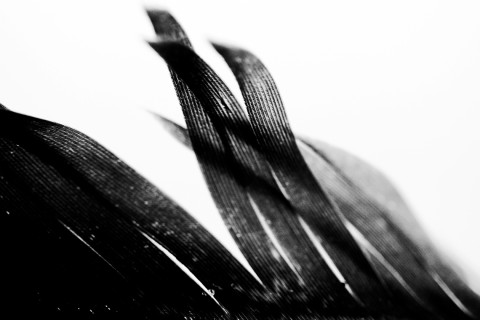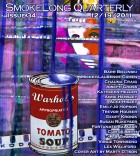I look down at my toes, dangling five hundred feet above the Atlantic. I hadn’t noticed before how they’re starting to pinch at the knuckle, like my father’s did. It’s cold up here. If it weren’t for this morning’s Mai Tais, I’d be wincing from the harness straps cinched tight across my sunburned belly. I told Andre my chest was too burnt for a lifejacket. He started to protest, but I told him my money could just as easily stay in my pocket. Above my head, the parasail canopy displays the Bahamian flag: gold, black, aquamarine. There’s no sound up here, just wind.
Far below, in the towboat, Andre starts waving his arms. I can’t tell what’s the problem. The rope between us is taut.
All morning I watched Andre’s dark, hard calves trudge back and forth across the sand. Finally he stopped and loomed over me, mercifully blocking the sun. “Mister,” he grinned, “you wanna get high?” A tired old line; I’d heard him use it all morning. His teeth were big and white, widely spaced like headstones.
“Have me back in time for the lunch buffet?” I asked, hauling myself up from my beach chair.
The horizon curves away, sky blurred to ocean. In the distance, puffy clouds darken and pile high. Waves skid hard in one direction, as if licked by a cat.
It’s something to see, alright, for a Texas boy. I grew up in the Panhandle. Landlocked, said Laney, my ex. For me, she moved north from Corpus Christi. Eventually she moved back south.
Sometimes Laney joined me when work put me on the hop from Amarillo to Dallas. I sell farm equipment, although I couldn’t tell you how to work the stuff. My folks were academics. Dad taught poli sci at West Texas A&M. Maybe I skipped college just to spite him. Maybe I became a salesman to set myself apart. But now I look at my toes, and I understand how very little we get to choose.
On one of those flights, over an endless patchwork of soybeans and feedlots, I said, “This must be what it’s like above the ocean.” Laney rolled her eyes, pulled on her headphones.
I should have known there’d be trouble when her book club picked Atlas Shrugged. Laney started saying things like, “The world needs failures to motivate the rest of us.” She took up Jazzercise and diet pills. I couldn’t keep up, so I stopped trying. I wish I could say I left her, but she was the one with all the energy.
She complained I wasn’t adventurous. A month after she left me, I booked this trip: The closest I’ve ever come to revenge.
The rum’s still in me, offering some comfort. The wind picks up, and the boat is turning hard now, away from the direction we were headed. Where did all the blue sky go? I look back over my shoulder to the beach, at the colorful dots I know are people. I wonder how many of them are like me, trying to prove they aren’t failures to people who don’t care.
Andre kneels by the winch, which should be reeling me in by now. But the wind pushes hard up into the sail. Andre and his equipment are outmatched by nature. And my bad luck, perhaps. There’s nothing I can do to help. There’s nothing I would do.
Below me, the choppy waves are capped with white. It occurs to me that this is bad. The winch is broken. I should be lower. I should be in the boat with Andre, speeding back to shore. The rum goes sour in my stomach and I start to shiver. My sunburn hurts and hot spit fills my mouth.
The rope snaps.
For a moment I don’t understand. There’s no taut line. Nothing’s holding me to the boat. Andre is frantic, waving his arms, yelling something, emergency instructions he probably gave me back on the beach when I should have paid attention.
There’s nothing holding me to anything, anymore. Surely I’ll just float down. Andre will fish me from the ocean and bring me ashore just in time. Rain pelts, cold and mean. Wind gusts. I’m not floating down. I’m drifting away. I’m headed towards the horizon. Toward nothing.
Finally I understand how ignorant I was. Farmland is not like the ocean. Disappointment is not like love. Survival is not life.
I picture Laney on a beach in Corpus Christi. I imagine her deeply tanned wearing a white one-piece. She was always so pretty in white. I imagine the gentle swell of her thighs, a slice of damp beneath each breast. I smell her warm skin. I wish we were back home, and I could still burrow into her as if she were a featherbed.
We’d have been okay, if everything was different.
The squall pulls me further from the beach and my hotel and the lunch buffet, starting now. The boat is just a speck. I hope Andre doesn’t blame himself. I hope he’s back working the tourists tomorrow. He can’t expect to control forces like wind and water: they’re wild, they have the upper hand. This storm will carry me as far as it pleases, and then I’ll drop into the ocean’s blue mouth. The rain whips sideways; wind screams in my ear. The roiling ocean smacks its lips. I should’ve taken the life jacket Andre offered, and the helmet while I was at it. But I don’t cry out. In this last moment, I am alone and I am brave.
I look down at my toes, dangling just a few feet above the Atlantic. My father is long dead. His toes don’t exist anymore, and, soon, neither will mine. I’m pitched towards nothing. I don’t fight it, never have.



 The core workshop of SmokeLong Fitness is all in writing, so you can take part from anywhere at anytime. We are excited about creating a supportive, consistent and structured environment for flash writers to work on their craft in a community. We are thrilled and proud to say that our workshop participants have won, placed, or been listed in every major flash competition. Community works.
The core workshop of SmokeLong Fitness is all in writing, so you can take part from anywhere at anytime. We are excited about creating a supportive, consistent and structured environment for flash writers to work on their craft in a community. We are thrilled and proud to say that our workshop participants have won, placed, or been listed in every major flash competition. Community works.